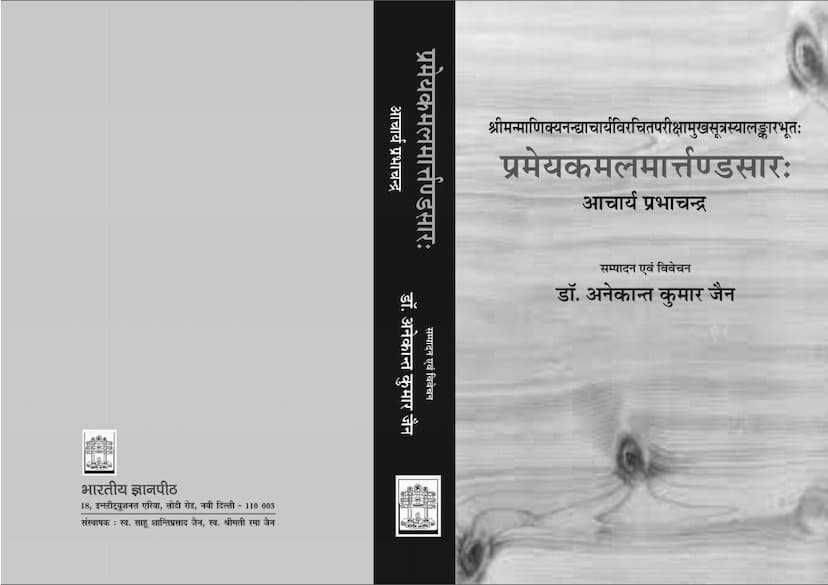Pramey Kamal Marttandsara
Added to library: September 2, 2025

Summary
This is a comprehensive summary of the Jain text "Pramey Kamal Marttandsara" by Anekant Jain, based on the provided pages from Bharatiya Jnanpith.
Book Title: Pramey Kamal Marttandsara (प्रमेयकमलमार्तण्डसारः) Author: Acharya Prabhachandra (आचार्य प्रभाचन्द्र) Commentary/Editing: Dr. Anekant Kumar Jain (डॉ. अनेकान्त कुमार जैन) Publisher: Bharatiya Gyanpith Original Work it Elaborates: Parikshamukha Sutra (परीक्षामुखसूत्र) by Shriman Manikyanandi Acharya (श्रीमन्माणिक्यनन्द्याचार्य)
Overall Nature of the Work:
"Pramey Kamal Marttandsara" is essentially a comprehensive and ornate commentary (a 'Tika' or 'Alankar') on Manikyanandi Acharya's "Parikshamukha Sutra," a foundational text in Jain Nyaya (Jain logic and epistemology). Acharya Prabhachandra's commentary is highly regarded for its depth, scholarship, and elaborate explanations. Dr. Anekant Kumar Jain's work is a summarized and accessible presentation of this commentary, making its profound philosophical insights available to a wider audience.
Key Aspects and Features of the Book:
- Focus on Jain Nyaya: The book delves into the core principles of Jain logic and epistemology as presented in the "Parikshamukha Sutra" and elaborated by Acharya Prabhachandra.
- Commentary on Manikyanandi's Work: It serves as an elucidation and amplification of Manikyanandi's concise aphorisms on valid knowledge and its fallacies.
- Acharya Prabhachandra's Scholarship: The work highlights Acharya Prabhachandra's immense knowledge of not only Jain Agamas but also various branches of Indian philosophy, Sanskrit grammar, literature, and even secular texts from various traditions (Vedas, Upanishads, Puranas, Mahabharata, Bhagavad Gita, Smritis, etc.). His commentary is noted for its detailed analysis, refutation of opposing viewpoints (purvapaksha and uttarapaksha), and presentation of numerous logical arguments.
- Dr. Anekant Kumar Jain's Contribution: Dr. Jain's role is that of an editor and summarizer. He has strived to present the essence and core arguments of the vast original commentary in a simpler, more organized, and accessible form. His aim was to overcome the challenge of the original work's sheer size, which made it difficult for students to study comprehensively in a classroom setting.
- Structure and Organization:
- The original text of "Prameyakamal Marttanda" has six chapters (Paricchedas).
- Dr. Jain has reorganized it into seven chapters for better pedagogical flow, dedicating a separate chapter to the crucial topics of 'Naya' (Standpoints) and 'Saptabhangi' (Seven-valued logic), which are central to Jain philosophy.
- Each point or explanation from the original commentary is presented with numbering and clear paragraphing to enhance readability.
- Key Concepts Discussed:
- Pramana (Valid Knowledge): The text extensively defines and explains Pramana, its nature, characteristics, and the logical arguments supporting its validity. It elaborates on the qualifiers of Pramana, such as 'Swa' (Self-cognition), 'Apurva' (Novelty), 'Artha' (Object), 'Vyavasayatmak' (Determinate), and 'Jnana' (Knowledge).
- Pramana Phala (Result of Valid Knowledge): It discusses the fruits of valid knowledge, which include the removal of ignorance, the inclination towards acceptance (upadana) of beneficial things, rejection (hana) of harmful things, and indifference (upeksha) towards neutral things.
- Pramana Bheda (Types of Valid Knowledge): It details the classification of knowledge, primarily into Pratyaksha (Direct Perception) and Paroksha (Indirect Knowledge).
- Pratyaksha: Explained in terms of its characteristics, including 'Vishedha' (distinctiveness) and 'Avyavadana' (non-obstruction). It differentiates between 'Mukhya Pratyaksha' (Principal Direct Perception, like kevala jnana) and 'Samvyavaharika Pratyaksha' (Conventional Direct Perception, like sensory perception).
- Paroksha: Subdivided into Smriti (Memory), Pratyabhijna (Recognition), Tarka (Reasoning), Anumana (Inference), and Agama (Testimony of a reliable authority).
- Hetu (Grounds of Inference) and Hetvabhasas (Fallacies of Inference): A significant portion of the book is dedicated to explaining the concept of Hetu, its essential characteristics (like 'Trirupya' and 'Anyathanupapatti' - non-obstruction), and the various fallacies (Asiddha, Viruddha, Anaikantika, Akinchitkara) that can vitiate an inference.
- Drishtanta (Example): The text explains the importance of examples in inference and discusses various types of fallacious examples (Drishtantabhasas).
- Naya (Standpoints): The seventh chapter focuses on the concept of Naya, which are epistemological standpoints or perspectives used to understand reality. It explains the classification of Nayas into Dravyarhtika (substance-oriented) and Paryayarthika (mode-oriented), and further sub-classifications like Naigama, Sangraha, Vyavahara, Rujusutra, Shabda, Samabhirudha, and Evambhuta.
- Saptabhangi (Seven-valued Logic): The text likely touches upon the sevenfold predication, a unique aspect of Jain logic that expresses the multifaceted nature of reality from different standpoints.
- Pramana vs. Pramanabhasas: A core theme is differentiating between valid knowledge and its fallacies, emphasizing how misconceptions or incomplete understanding lead to fallacious conclusions.
- Debate and Refutation: The work engages in dialectical discussions, refuting the views of other philosophical schools like Buddhism (especially regarding momentariness - kshanabhangavada, nirvikapaka perception), Mimamsa (e.g., on self-cognition, scriptural authority), and Nyaya-Vaisheshika (e.g., on the nature of cause, conjunctions, and the concept of 'karyasakalya').
- End Goal: The ultimate aim of understanding Pramana and Naya is to discern the path to liberation (moksha) by correctly understanding what is to be accepted (upadeya) and what is to be rejected (heya).
- Appreciation for Gurus: The editor, Dr. Anekant Kumar Jain, expresses deep gratitude to his teachers and inspirations, including his father, Prof. Phoolchand Premi, and other esteemed scholars, highlighting the tradition of knowledge transmission in Jainism.
- Scholarly Effort: The book represents a significant academic endeavor by Dr. Anekant Kumar Jain to edit and present a complex and extensive Jain philosophical text, making its wisdom accessible through a summary and commentary in Hindi.
In essence, "Pramey Kamal Marttandsara" is a monumental work of Jain epistemology and logic, serving as a detailed explanation of Manikyanandi's "Parikshamukha Sutra." Dr. Anekant Kumar Jain's edited version aims to bring this profound discourse on knowledge and reality to a broader audience, preserving the core insights of Acharya Prabhachandra's masterful commentary.